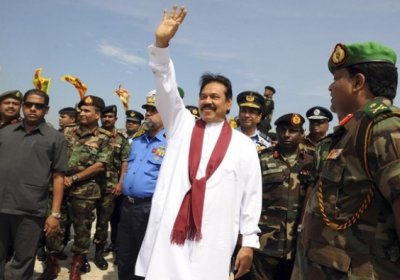Update: An earlier version of this article reported that asylum seeker Puvaneethan reboarded the plane after protesting passengers had been removed. Reports have now confirmed he is now back in Maribyrnong detention centre in Melbourne.
***
Three passengers were removed from a Qantas flight from Melbourne to Darwin this morning after refusing to take their seats in protest against the transfer of an asylum seeker on the same flight.
Sri Lanka
Allegations made by south Indian Tamil fisherfolk against the recently deposed Mahinda Rajapaksa government in Sri Lanka reveal a trail of death and corruption.
They said 750 fisherfolk have been killed by the Sri Lankan navy since 1983. Eighty-four boats were seized in the past six months alone.
Maithripala Sirisena has taken office as president of Sri Lanka after winning the island's January 8 election. Sirisena won 51.28% of the vote, defeating incumbent president Mahinda Rajapaksa, who got 47.58%.
Seventeen other candidates won 1.14% of the votes between them.
Rajapaksa had been elected president in 2005 and re-elected in 2010. In his first term, he presided over the most brutal phase of the war between the Sri Lankan government and the Liberation Tigers of Tamil Eelam (LTTE).
The statement below was released by the Tamil Refugee Council in Australia on January 9. The day before, opposition-backed presidential candidate Maithripala Sirisena beat incumbent president Mahinda Rajapaksa, who oversaw war crimes and abuse of the human rights of Tamils and others in Sri Lanka.
***
The Tamil Refugee Council urges the Australian government to use the change of leadership in Sri Lanka to push for a resolution to the country’s most pressing issue – the long-standing oppression and persecution of Tamils.
Sri Lankan President Mahinda Rajapaksa is being challenged by Maithripala Sirisena, who was until recently one of his ministers, in the January 8 presidential elections. However, many Tamils and leftists see little difference between the two.
Sirisena is being supported by the opposition United National Party, and has promised to appoint UNP leader Ranil Wickramasinghe as prime minister. There are 16 other candidates.
Sinnathamby Krishnarajah was arrested on October 25, in Kilinochchi, a town in the north of Sri Lanka.
His “crime” was to photocopy forms printed from the internet to be used for making affidavits to a United Nations investigation of war crimes committed during the war between the Sri Lankan government and the Liberation Tigers of Tamil Eelam (LTTE).
The LTTE, which had been fighting for an independent Tamil state in the north and east of the island, were defeated in May 2009. Since then, Tamil areas have been under military occupation by the Sri Lankan army.
The Court of Justice of the European Union has annulled the EU’s ban on the Liberation Tigers of Tamil Eelam.
The ban was imposed in 2006. The Council of the EU claimed that the LTTE, which had waged an armed struggle for an independent Tamil homeland against the Sri Lankan state, was a terrorist organisation.
After its military defeat in May 2009, the LTTE no longer exists in its original form of an armed independence movement. However, the continued ban on the LTTE has restricted the peaceful political activities of Tamils campaigning for human rights and national self-determination.
The Liberation Tigers of Tamil Eelam (LTTE) fought for an independent Tamil homeland in the north and east of the island of Sri Lanka.
The group was formed in response to discrimination against the Tamil people by the Sri Lankan government, after peaceful protests had been repeatedly met with violent repression. It waged an armed struggle for nearly three decades.
The LTTE was militarily defeated in 2009, and no longer exists. Yet people are still being penalised for alleged links with the group. This is happening in Sri Lanka, in Australia, and in other countries.
Was I a Stranger in My Homeland?
By Malavi Sivakanesan
Xlibris, 2013
Malavi Sivakanesan was eight years old in 2003 when her father, a Tamil dentist living in exile in Norway, went back to his homeland in Sri Lanka to set up a mobile dental clinic.
He not only carried out dental work himself, but also trained local people to continue after he left.
At the time, there was a ceasefire between the Sri Lankan government and the Liberation Tigers of Tamil Eelam.
During a recent visit to China, Sri Lankan president Mahinda Rajapaksa signed an agreement to give China 1200 acres of land in the Trincomalee area on a long term lease for “defence-related development”.
Part of this land is occupied by temples, mosques, schools and houses. The Tamilnet website said about 450 families will lose their homes. Those affected are mainly Tamil-speaking Muslims.
China’s plans for the area are unknown. However, Trincomalee’s renowned natural harbour, situated on the north-east coast of the island of Sri Lanka, was used as a naval base by the British.
Dr Paikiasothy Saravanamuttu, executive director of the Centre for Policy Alternatives in Sri Lanka, gave a talk on “The challenge of moving from post-war to post-conflict in Sri Lanka” at a June 21 meeting held in the Darebin Intercultural Centre in Melbourne. The following is a summary of his talk compiled by Michael Cooke. *** The end of the war [between the Sri Lankan state and the Liberation Tigers of Tamil Eelam in 2009] does not mean the end of conflict. The guns are silent, but the sources of conflict remain, and are being reproduced.
Sri Lanka has confirmed plans for asylum seekers from its persecuted Tamil ethnic minority to be directly handed over by Australia at sea. Although the Australian government has refused to confirm or deny such plans, Prime Minister Tony Abbott said on July 3 that Sri Lanka was “a society at peace” that had made “much progress” on human rights.
That day, the Tamil Refugee Council released a statement explaining the true situation in Sri Lanka that included the ive points below.
* * *
- Previous page
- Page 8
- Next page





